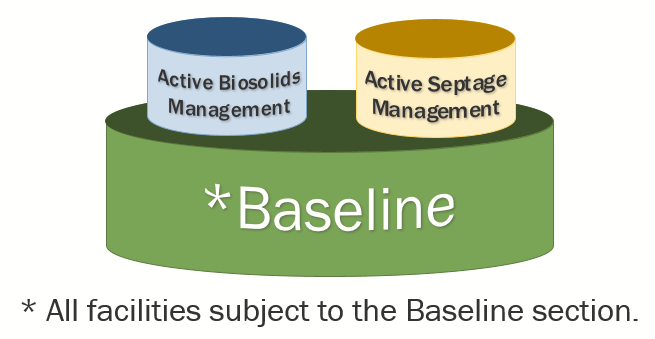Washington's biosolids permit system
Biosolids managers can learn about the Statewide General Permit for Biosolids Management and how to apply for coverage.
Statewide general permit for biosolids management
The statewide general permit for biosolids management is the main document that guides our implementation of Washington’s biosolids rules (Chapter 173-308 WAC) for wastewater treatment plants and other facilities that manage biosolids. We can modify coverage for individual facilities to include additional or more stringent requirements on a case-by-case basis. This approach allows facilities to develop programs that work well for them and it helps us implement appropriate permit conditions.
The general permit is active for five years. We begin permit development by issuing a preliminary determination. After reviewing comments on the appropriateness of a general permit, we either move forward with the proposal or withdraw it in favor of another approach.
If a determination is made to move forward with a general permit, we begin drafting the permit document. We then make the draft general permit available for public review and host public meetings and hearings, and invite anyone interested to provide comments. Once we have reviewed all comments received, we either move forward with the proposal or withdraw it in favor of another approach.
We then publish a response to all comments received. If we move forward with a general permit, changes made to it will be based on the input we received.
An application for coverage is due from all facilities with active management programs within 90 days from our issuance of a final general permit. Facilities requiring coverage under the baseline section of the permit only will be automatically covered on the effective date of the permit. We will review the highest priority applications first. A public hearing may be required before we make a final decision on an individual facility approval.
We may impose additional or more stringent requirements, based on the proposal and local conditions.
Gaining coverage under the general permit
A permit application is an application for coverage under the statewide general permit. We can impose additional or more stringent requirements to address specific local conditions. Depending on timing and the nature of operations, all facilities submit either a notice of intent (NOI) to be covered under the general permit or an application for coverage, or both.
When we review a permit application, we also consider any sites where land application is proposed. If a facility wishes to make substantial changes to their operations at a later date, that is considered a permit modification and must go through the appropriate steps of the process, including a SEPA review and public notice. There may also be public hearings for individual facilities or specific land application sites. We will determine the need for a public hearing on an individual facility proposal based on an assessment of the overall proposal and the level of public interest.
Agreed orders
All permit actions had to be handled under an "agreed order" process while the expired general permit was in effect. This is the same as the general permit process, and included a review under the State Environmental Policy Act and public notice.
An agreed order is binding and does not include a right of appeal for the applicant. It will require applicants to transition to the new permit once it is in effect. This includes complying with new requirements. New facilities can begin the permit process, but we may not complete permit review and approval until a new general permit is in effect.
All facilities with operations covered under an agreed order must submit an application for coverage under the new general permit for biosolids management.
New general permit structure
The new permit has been reorganized into three main sections.
- Baseline
- Active septage management
- Active biosolids management
This graphic represents the permit sections as buckets. The baseline section, shown in green, establishes general requirements that apply to all facilities. The blue and yellow buckets represent the active biosolids management and active septage management sections that establish requirements specifically for active management programs.
An active management program means they treat, sell, give away exceptional quality biosolids (EQ), or directly apply biosolids and/or septage to the land.
Who must submit a permit application?
- All facilities with operations approved under an agreed order will be required to complete a full permit application.
- All new facilities beginning operations after Sept. 4, 2020 must complete a permit application.
- Existing facilities with active management programs must also submit a complete permit application. Existing facilities can reference the biosolids facility list to determine what permit sections they are subject to.
All facilities can also reference this flow chart to determine which permit sections apply to your facility.
Submitting a complete application secures "provisional approval” of coverage. Provisional approval means a facility must follow state rules, general permit conditions, and their own proposal as outlined in their application submittal until we advise otherwise, or until we complete our review of the application. A facility’s proposal cannot circumvent the requirements of the rules or general permit, of which we expect managers to be knowledgeable.


